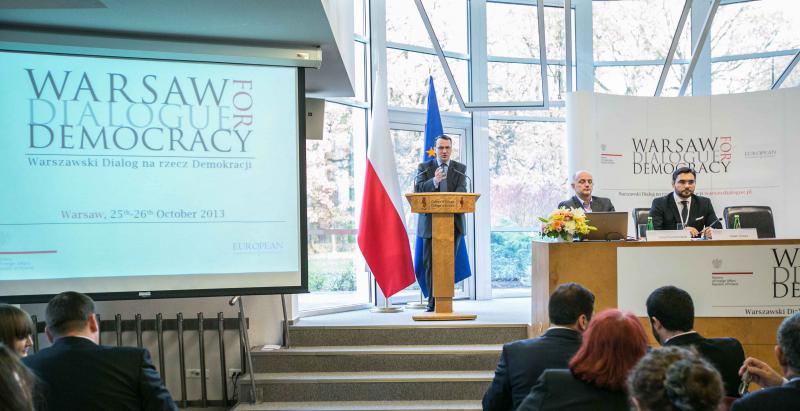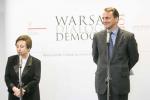Online and offline. From virtual reality into real democracy
4- 28.10.2013, 11:59
- 13,510
New media – web-sites, blogs, social networks – paly a huge role in transformations around the world.
On 25-26 October an international conference “Warsaw Dialogue for Democracy” took place in the Polish capital.
The event was organized by Poland’s Ministry of Foreign Affairs and the European Endowment for Democracy.
Representatives of democratic movements, human rights organization and independent media from the USA, Russia, Belarus, Moldova, Ukraine, Azerbaijan, Armenia, Syria, Iran, Libya, Lebanon, Tunisia, Egypt, Kenya and other countries took part in the conference, which this year was titled “Online and Offline. From virtual reality to real democracy”.
The “Warsaw Dialogue for Democracy” was opened by Poland’s Minister of Foreign Affairs Radoslaw Sikorksi, a famous human rights activist from Iran, Nobel Peace Prize winner Shirin Ebadi, the deputy Minister of Foreign Affairs and European Integration of Moldova Iulian Groza and the head of the European Endowment for Democracy foundation Jerzy Pomianowski.
“The fact that others want to learn from our experiences makes us proud”, - Polish Minister of Foreign Affairs Radoslaw Sikorski said.

“Warsaw is a good place to discuss the transformation of countries from dictatorship to democracy, because ours is a success story. We believe that we have the transformation know-how. It was during our Presidency of the EU Council that we managed to convince Europe to support the idea of establishing the European Endowment for Democracy which began its operations this year”, - Sikorski said at the briefing for media.
The minster also noted that new communication technologies played an increasingly important role in promoting democracy by helping societies to effectively self-organize. He mentioned the situation in Egypt and Middle East as an example. He took notice of the conference topic for this year “Online and Offline. From virtual reality to real democracy” and emphasized that the two-day format provided the opportunity to discuss how Polish experience could be used in other countries. “The fact that others want to learn from our experiences makes us proud”, - he concluded.
Shirin Ebadi, a 2003 Nobel Peace Prize Laureate, highlighted that the most valuable thing about the Polish transformation process was the fact that it went peacefully and did not lead to a civil war.
“Unfortunately, it goes differently in other countries. Syria could be an example, which for 2.5 years has been struggling with the misery brought by the civil war, where civilians die and every third person has to leave the country”, - she said.
The human rights activist said that the opposition in Iran did not want to resort to violence and brutality. “We are fighting peacefully for democracy. Currently a large number of students, lawyers, journalists are in prison, but the repressions on the part of the government, fortunately, do not lead to violence on the part of the society”, - Shirin Ebadi said.
According to her, death penalty is executed in Iran on the daily basis, women are discriminated, there are no free elections, but there is efficient censorship. Nevertheless, she is certain about the opposition’s victory. “I know that one fine day we will win like the way you did”, - she added.
Iulian Groza stated that Moldova was on the way of transformations. In the deputy minister’s opinion, the European Union offers one of the best models a country can build on in managing its transformation, and his country in many ways uses Poland’s experience for carrying out democratic reforms. “Moldova wants to achieve the EU membership and is willing to follow all the necessary rules”, - Iulian Groza noted.
In turn, Jerzy Pomianowski remarked that democracy cannot be exported. In his opinion, the impulse must come from the inside. “However, such country should not be left without support. And this is precisely the reason why the European Endowment for Democracy was established. Yes, sometimes change is hard to reach, but this does not mean that support should not be provided”, - he stressed.
A video address of the UN Secretary General Ban Ki-moon was played at the conference. He greeted the participants of the “Warsaw Dialogue for Democracy” and noted: “We should remind the states of their main responsibility – ensure that human rights are observed. I like the topic of this conference “Online and Offline. From virtual reality to real democracy”. I urge everyone to go from online to offline”.
At the conference “Warsaw Dialogue for Democracy” Belarus was represented by the leader of the European Belarus civic campaign, a presidential candidate in 2010 elections and a former political prisoner Andrei Sannikov, the chairman of the Belarusian Helsinki Committee Aleh Hulak, a coordinator of the European Belarus civic campaign and a former political prisoner Dzmitry Bandarenka, the deputy chairman of the human rights center Viasna Uladzimir Labkovich, the charter97.org web-site’s editor-in-chief and a former political prisoner Natalia Radzina, members of the political council of the United Civil Party Aliaksandr Dabravolski and Valiancina Palevikova, a civil activist Andrej Abozau, a co-director of the Belarusian House in Warsaw Ales Zarembiuk and others.
Speaking about the conference’s outcomes a coordinator of the European Belarus civic campaign and a former political prisoner Dzmitry Bandarenka stated:
“The conference is interesting by the fact that the leaders of many democratic moveemnts were present here, from the leader of the underground Solidarity Zbigniew Bujak and to the chairman of the Syrian Opposition Council Ahmad Moaz al Hatib, and also many people, who played key roles in the Arab Spring revolutions. It is bliss to observe the energy of these people, who represent world’s different regions, but are similar in their yearning for freedom and common promotion of democratic values.
One of the sessions was on the necessity to register for history the processes that are taking place today, which means to create archives of democratic movements, register, among others, the crimes of dictatorial regimes. The head of Poland’s Institute of People’s Memory Lukasz Kaminski and a Czech human rights activist Petrushka Shustova spoke about that. This is important for representatives of different countries.
There was a special environment behind the scenes of the conference, because there was an opportunity to exchange experience with people, who made revolutions in their countries. It is absolutely clear that a huge role in today’s transformations around the world is played by new media – web-sites, blogs, social media. A known Egyptian blogger Esraa Abdel Fattah took part in the conference, bloggers from Tunisia, a representative of the Russian Novaya Gazeta newspaper Olga Bobrova and the editor-in-chief of the Belarusian charter97.org web-site Natalia Radzina.
It was not just a conference of NGO people, but people, who went through prisons, got used to speak before multi-thousand audiences, organized multi-thousand and multi-million protest actions. These people know what they are worth and have their own view of the event taking place in the world. The position of the USA and European Union countries was strongly criticized for the attempts to have dialogues with dictators in different countries, for the inconsistency of the actions, for the late response to these or those events. Among other I was surprised by the fact that in all the panel discussions (and other participants noted that too) there were no key note speakers from Belarus.
At the same time representatives of the countries, where democracy has won, and democratic countries, including Poland, spoke of the possibility that the euphoria or the victorious revolutions could in a very short time lead to the emergence of new regimes that violate human rights and do not observe democratic values like it happened today in Egypt, where legally elected Morsi started reducing democracy, or like it happened in Tunisia, where there was a second wave of revolution against the Islamist government, which had won the elections.
In this regard I would like to single out the uniqueness of Poland’s position, which has huge successful experience of resistance and reforms“, - Dzmitry Bandarenka said.
The charter97.org web-site’s editor-in-chief Natalia Radzina pointed at the emergence of new trends in the fight for democracy in the countries with totalitarian regimes:
“It is obvious that the role of the internet and new media has increased, they are actually able of influencing the situation and lead to actual changes. The representatives of Egypt and Tunisia spoke of that, where internet-journalists and bloggers could mobilize the population for protests. At the same time they noted that in dictatorial countries parties and politicians lose trust, and people trust new media more, direct communication with like-minded people takes place there as well as mobilization. By this, actually, I explain the repressions against the charter97.org web-site after the presidential elections of 2010. Our readers came from online out to offline – to the Square in order to stand up for their right for free and fair elections”, - the journalist said.















